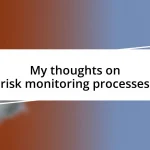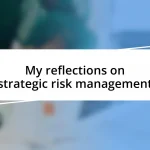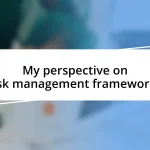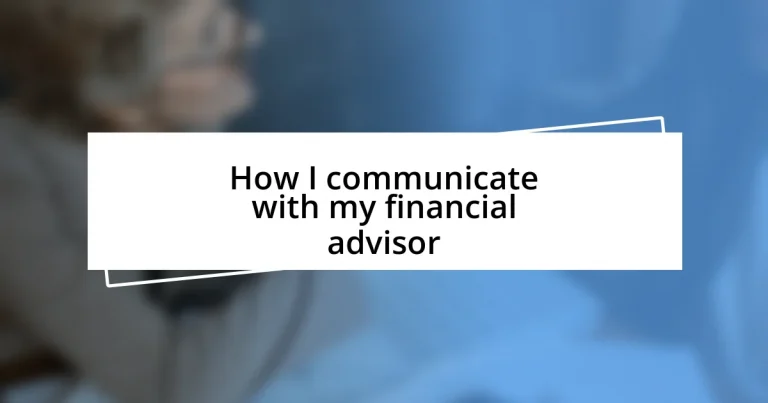Key takeaways:
- Establishing clear communication preferences and goals with your financial advisor fosters a productive and trusting relationship.
- Preparing for meetings by jotting down questions, reviewing financial statements, and setting specific goals enhances the efficiency of discussions.
- Openly discussing financial aspirations and any life changes allows advisors to provide tailored advice and create collaborative strategies that align with your objectives.
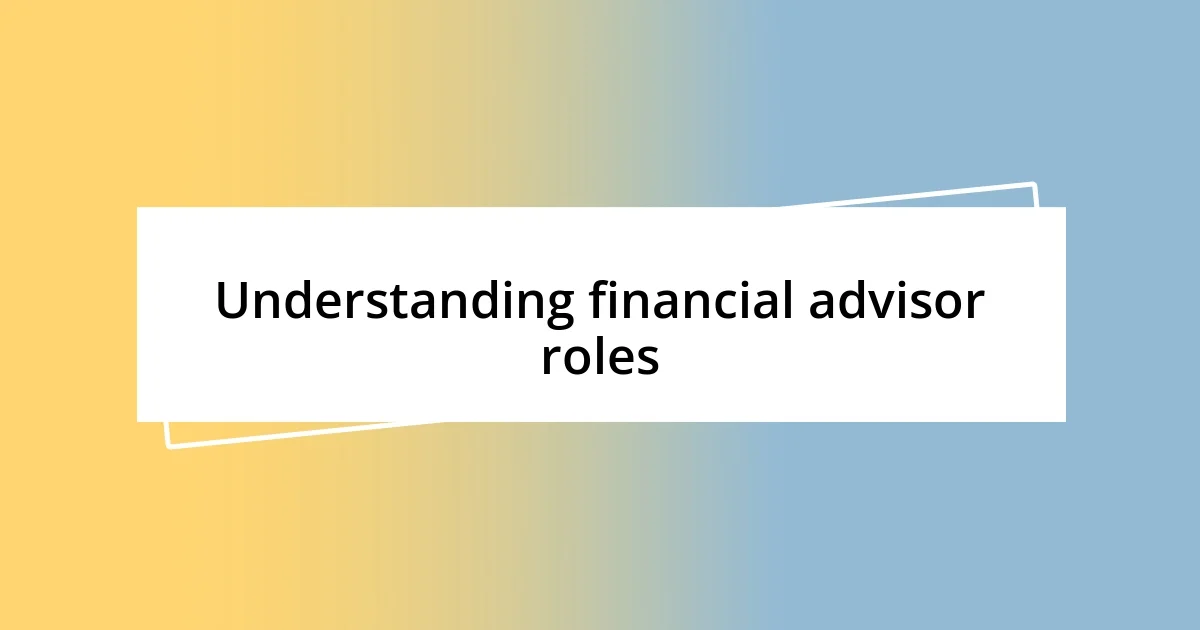
Understanding financial advisor roles
Financial advisors wear many hats, serving as educators, strategists, and emotional support for clients who may feel overwhelmed by their financial decisions. I remember the first time I sat down with my advisor; I had so many questions swirling in my mind that it felt daunting. It struck me that they are more than just number crunchers; they genuinely care about guiding us towards our financial goals.
Understanding the different roles financial advisors play is crucial. For instance, some specialize in investment management while others focus on retirement planning or estate issues. I’ve found my advisor’s ability to tailor their advice to my unique situation invaluable, making me wonder how I ever navigated financial decisions without their expertise.
One role that resonates strongly with me is that of a financial coach. Advisors help to build our confidence in financial matters, often tackling emotional barriers just as much as financial ones. Have you ever felt anxious about talking money? I certainly have, yet my advisor’s patience and understanding created a safe space for me to express those fears, ultimately transforming my perspective on finances.
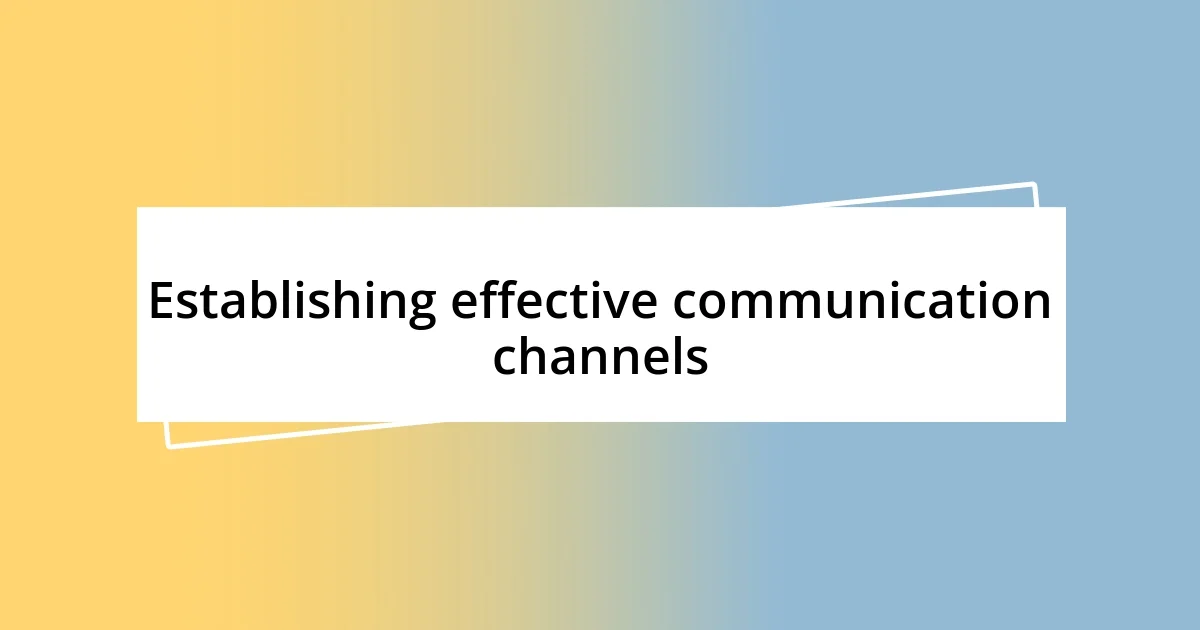
Establishing effective communication channels
Effective communication with my financial advisor is essential for fostering a trusting relationship. I’ve realized that setting up the right communication channels makes all the difference. At the outset, I openly discussed my preferences regarding how frequently I’d like to connect, whether in-person, through email, or via video calls. This initial conversation really set the tone.
Here are some key elements to consider when establishing communication channels with your advisor:
- Preferred Methods: Discuss whether you prefer phone calls, emails, or in-person meetings. Each has its own set of benefits.
- Frequency of Check-ins: Decide on how often you want updates—monthly, quarterly, or annually.
- Response Times: Understand how quickly your advisor typically responds to inquiries, so you’re both on the same page.
- Topics of Discussion: Clearly outline the types of issues you want to discuss, ranging from investment strategies to life changes.
Creating these guidelines allowed me to feel more comfortable sharing my thoughts and concerns, knowing that there was a clear expectation for how our communication would flow. Over time, I’ve found that being proactive about communication results in a more productive partnership, allowing us to navigate my financial journey with confidence and transparency.

Preparing for your meetings
Preparing for meetings with my financial advisor is a vital step that ensures I get the most out of our time together. I always take a moment to jot down notes or questions that have arisen since our last meeting. This practice helps me clarify my thoughts and ensures I don’t forget anything important. In my experience, showing up prepared not only makes our discussions more efficient but also demonstrates my commitment to my financial goals.
It also helps to review my financial statements and any updates in my financial life before our meetings. For instance, I once realized I had changed jobs, which impacted my retirement plan significantly. Bringing up such changes during my session allowed my advisor to tailor strategies that truly served my evolving situation. I learned that the more information I provide, the better equipped my advisor is to assist me.
Lastly, I like to set specific goals for each meeting. This could be as simple as reviewing my portfolio or discussing potential savings strategies for an upcoming vacation. Establishing these goals keeps me focused and ensures that I make the most of the time we have together. It’s empowering to take charge of my financial journey, and I encourage others to embrace a proactive mindset when preparing for their own meetings.
| Tips for Preparing for Meetings | Benefits |
|---|---|
| Write down questions and notes | Ensures all concerns are addressed |
| Review financial statements | Helps identify recent changes |
| Set specific meeting goals | Keeps discussions focused and productive |
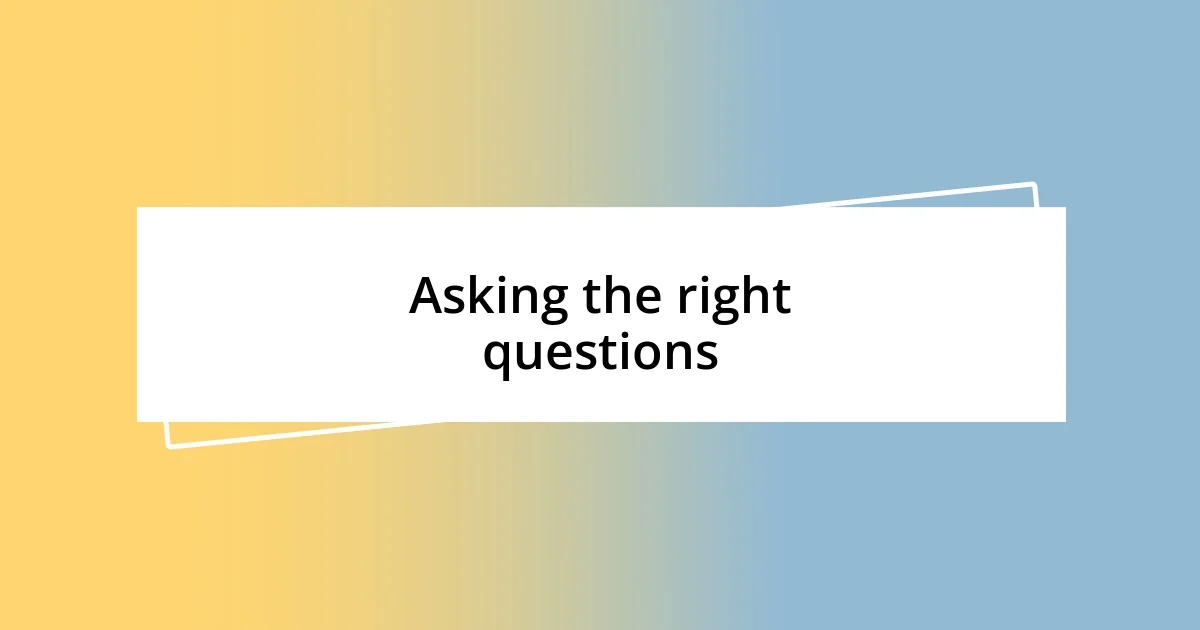
Asking the right questions
Asking the right questions is crucial for me when engaging with my financial advisor. I remember early on, feeling overwhelmed and uncertain about my financial future. By asking pointed questions like, “What should I prioritize — saving for retirement or paying off debt?” I found that I received tailored advice that truly resonated with my circumstances.
One question that has always been a game-changer for me is, “How can we adjust if my life changes?” Thinking about future scenarios can sometimes feel daunting, but it’s empowering to explore options proactively. I once asked this during a meeting after experiencing a significant change in my personal life, and it opened the door to discussions about flexibility in my investment strategy that I hadn’t considered before. Seeing my advisor’s eyes light up at the opportunity to create a tailored plan for me reinforced how vital this question was.
I also like to ask about the rationale behind certain recommendations. For example, when my advisor suggested reallocating some funds, I questioned, “What is the reason for this shift?” Understanding the reasoning helps me feel more confident in my decisions. After all, financial literacy is a journey, and asking the right questions along the way fosters a deeper connection and builds a collaborative spirit in our partnership. Have you ever wondered how one question could change the entire course of a financial strategy? I certainly have, and the answers often illuminate new paths and opportunities.
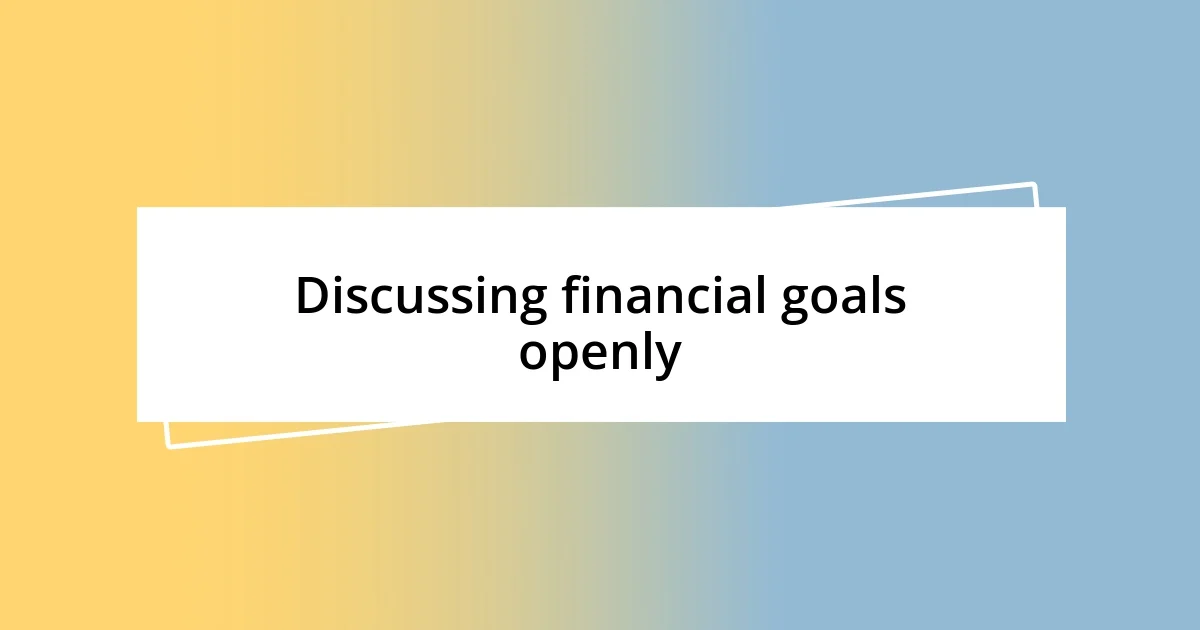
Discussing financial goals openly
Discussing financial goals openly is like unlocking a treasure chest filled with possibilities. I vividly recall the first time I shared my long-term aspirations with my advisor. It was a mix of excitement and vulnerability, but when I articulated my goal of buying a house in five years, it changed the dynamic of our meetings. Suddenly, we were crafting a plan that wasn’t just about numbers; it became personal and aligned with my dreams.
I find that honesty is key in these conversations. There have been moments when I hesitated to mention specific financial pressures, like my mounting student loans. However, once I opened up about this burden, my advisor was able to suggest strategies I hadn’t considered. Isn’t it empowering to share what truly matters? I think so. It made me feel more connected to my advisor, knowing that we could tackle any hurdle together.
Each time I set new financial goals, I try to communicate them clearly. For instance, during one session, I expressed my desire to save for my son’s education. That conversation paved the way for discussions about investment options specifically geared towards college savings plans. How often do we miss opportunities simply because we’re not being transparent about our objectives? In my experience, being candid about my aspirations has always led to richer insights and stronger strategies.
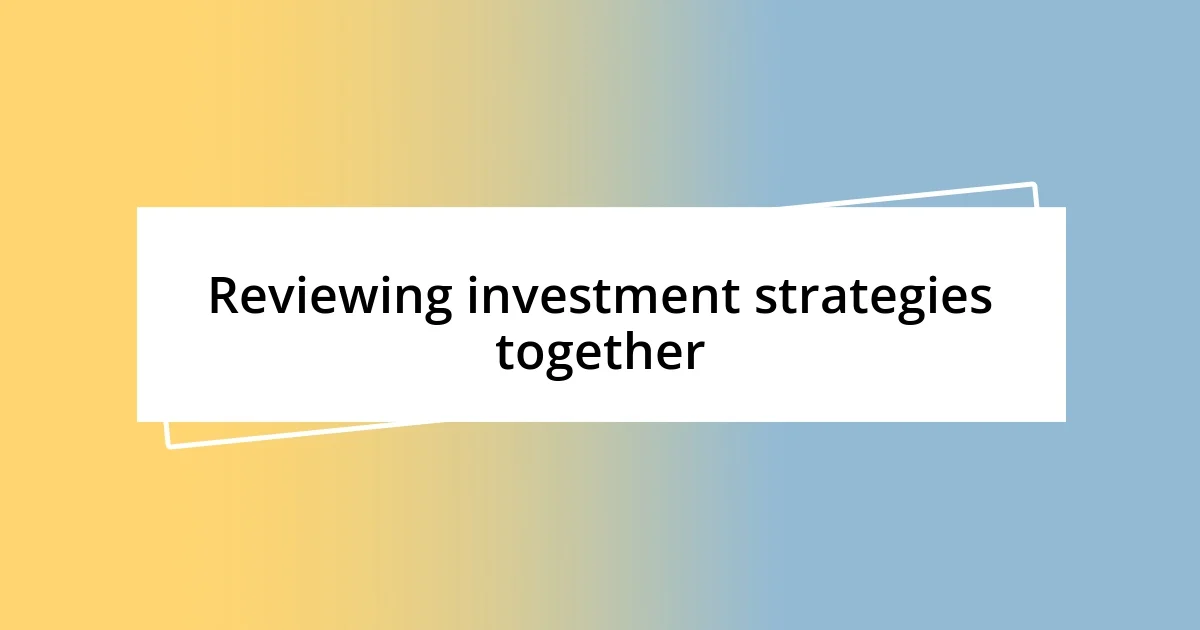
Reviewing investment strategies together

Reviewing investment strategies together
When it comes to reviewing investment strategies, I always appreciate a collaborative approach. I remember one particular meeting where I brought in my performance report, a mix of excitement and anxiety bubbling inside me. As I shared my concerns about certain investments lagging behind, my advisor smiled and said, “Let’s dive into it together.” That instant team spirit made all the difference; it felt reassuring to tackle those challenges side by side.
I find that analyzing performance together creates a space for honest feedback. For instance, after a particularly volatile quarter, we examined which investments had underperformed and why. I asked, “Are these still in line with my goals?” This moment of reflection not only brought clarity but also reinforced my confidence in my strategy. Have you ever noticed how discussions about setbacks can sometimes reveal new opportunities? It certainly did for me, as we identified sectors to adjust, opening different avenues I hadn’t previously considered.
Furthermore, I value the discussions about risk tolerance during these reviews. There was a time when my appetite for risk changed because of personal circumstances. I recall saying, “I feel more cautious lately; should we reassess?” This question led us to recalibrate my portfolio, aligning it with my current comfort level and goals. It’s fascinating to think that simply opening up about my feelings can lead to empowering adjustments. How do you approach these delicate conversations? Just like in any partnership, I believe that being transparent about my thoughts makes for a more productive strategy review.

Following up after discussions
Following up after discussions is crucial for maintaining momentum. After each meeting with my advisor, I make it a point to send a quick email summarizing our key takeaways. This practice not only helps solidify my understanding but also gives my advisor a chance to clarify anything that might have been confusing. Have you ever left a meeting thinking you understood everything, only to later realize you missed a key detail? Keeping that line of communication open can save a lot of headaches down the road.
I also find that revisiting our previous conversations fosters a sense of accountability. For example, after we set a savings goal, I like to check in a month later to share my progress. It feels rewarding to report back on my achievements, but it also gives me a chance to address any challenges I might be facing. Have you ever felt hesitant to admit when you’re struggling? In my experience, acknowledging these hurdles allows my advisor to provide tailored advice to help me get back on track.
Another aspect I appreciate is the opportunity for feedback. Sometimes, I ask my advisor how they think I’m doing in managing my financial habits. It’s a bit vulnerable to put myself out there, but their insights help me refine my approach. Have you considered asking for feedback in your financial journey? I often walk away from those discussions with actionable steps that feel doable, and it reinforces my partnership with my advisor as we navigate this journey together.




